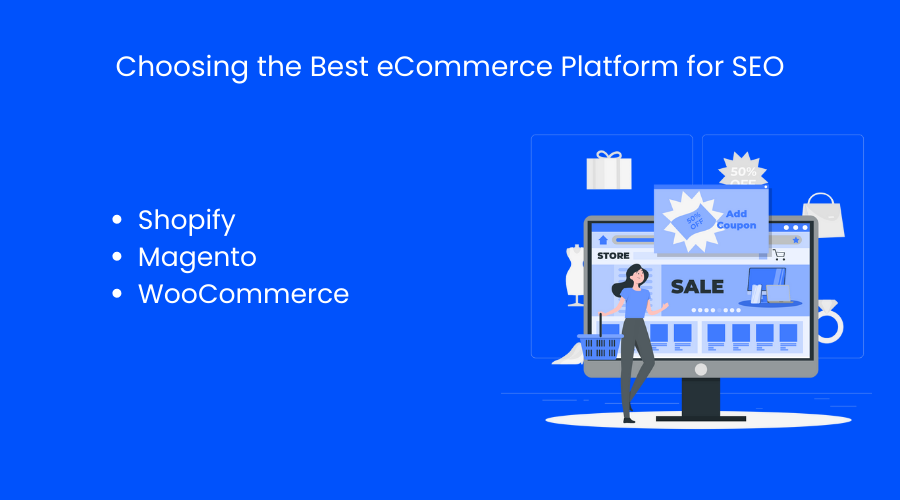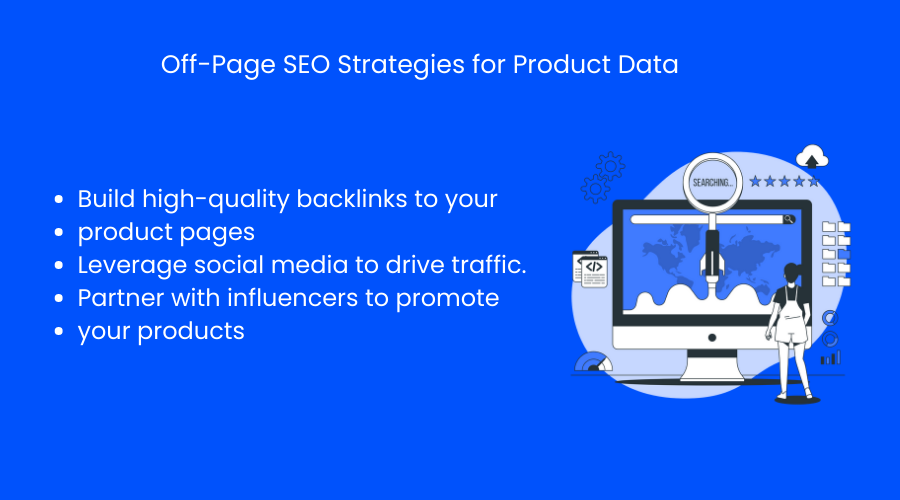Have you ever wondered how some eCommerce businesses consistently rank high on search engines and generate more sales than others? The secret lies in their effective use of SEO and product data optimization.
With eCommerce becoming increasingly popular, it’s more important than ever to stand out from the competition. One way to do this is through SEO.
This means making sure your products are visible on search engines like Google so that potential customers can find them easily.
In this blog, we will explore all the essentials of SEO for e-commerce businesses and how product optimization can help boost sales.
What is Product Data?
Product data basically refers to the information and attributes that describe a product.
It includes certain details such as product descriptions, price, dimensions, weight, colour, and other specifications that help customers in making a purchase decision.
In e-commerce, product data is crucial for presenting your products accurately and effectively to customers and for optimising your products for search engines like Google.
Rank higher than your competitors with Apimio’s PIM software!
Start optimizing your product data now with Apimio’s PIM software today!
Understanding Product Data Optimization
Product optimization involves ensuring that your product data is structured, complete, and accurate. This optimization process impacts SEO and sales by improving the visibility of your products and increasing the likelihood of conversions.
Apimio’s PIM software is designed to help businesses optimise their product data for eCommerce search engines.
Importance of Conversion Rate Optimization
Conversion Rate Optimization (CRO) is very important for any business online. It helps in making sure that more visitors to a website become customers or leads.
Moreover, by checking and improving different parts of the website like design, content, and buttons, CRO increases the chances of turning visitors into loyal customers.
This leads to more sales and better business performance. CRO uses data to make smart decisions, improve how customers interact with the website, and build trust.
Last but not least, it helps businesses succeed online and stand out from the competition.
Choosing the Best eCommerce Platform for SEO

When it comes to choosing the best eCommerce platform for SEO, there are several key considerations to keep in mind. The platform should be user-friendly, secure, and able to handle high traffic.
Additionally, it should allow for easy integration with Apimio’s PIM software to ensure that your product data is consistent across all channels.
Some of the best eCommerce platforms for SEO include:
How to optimise product data for SEO?
To optimize your product data for SEO, it’s essential to ensure that all the essential product data elements are in place. These elements include product titles, descriptions, images, and attributes.
Here are some best practices for product data SEO:
- Use descriptive and unique product titles that include relevant keywords.
- Write detailed and informative product descriptions that highlight the benefits and features of the product.
- Optimize images by using alt tags and descriptive filenames.
- Use structured data markup to provide search engines with more information about your products.
Apimio’s PIM software can help centralize and standardize your product data, ensuring that it’s optimized for eCommerce SEO.
On-Page SEO Strategies for Product Data

On-page SEO refers to optimizing the elements on a webpage to improve search engine rankings. When it comes to eCommerce, on-page SEO is essential for product optimization.
Following are some on-page SEO strategies for optimizing product data:
- Use internal linking to improve navigation and user experience.
- Optimize product URLs to include relevant keywords.
- Use header tags to organize content and improve readability.
- Write unique meta descriptions for each product page.
1. Use internal linking to improve navigation and user experience.
Internal linking is the practice of linking relevant pages within your website to each other.
When applied to product data pages, this strategy helps users easily navigate through your site, finding related products or additional information effortlessly.
By including links to other relevant product pages or helpful resources, you make it convenient for visitors to explore more, increasing their engagement and the time they spend on your site.
This also benefits search engines, as they can crawl and index your pages more effectively, enhancing your site’s overall visibility in search results.
2. Optimize product URLs to include relevant keywords.
When creating URLs for your product data pages, it’s essential to use relevant keywords that describe the product accurately.
Moreover, a well-optimized URL not only helps search engines understand the content of the page but also makes it more user-friendly and shareable.
Avoid using long strings of numbers or meaningless characters in your URLs; instead, aim for concise and descriptive URLs that include the product name or essential keywords.
This improves the page’s chances of ranking higher in search engine results when users search for those specific terms.
Revolutionize your eCommerce strategy with Apimio PIM.
Centralize and standardize your product data for optimized SEO and better results!

3. Use header tags to organize content and improve readability.
Header tags (H1, H2, H3, etc.) are HTML elements that define the headings and subheadings on a web page.
For product data pages, using header tags to structure the content is crucial for both users and search engines. The H1 tag should contain the main product title, followed by H2 tags for subheadings, and so on.
This organization makes the page easier to read and comprehend for users, as they can quickly scan and find relevant information.
Additionally, search engines use header tags to understand the page’s hierarchy and content structure, which can positively impact your SEO performance.
4. Write unique meta descriptions for each product page.
Meta descriptions are brief summaries that appear in search engine results below the page title. It is essential to create unique meta descriptions for each product data page.
These descriptions should be concise and compelling, providing a clear overview of what the page offers. Including relevant keywords in the meta description can improve the page’s chances of appearing in relevant search queries.
Moreover, an enticing meta description can also encourage users to click on your page, driving more organic traffic and potentially increasing your click-through rate (CTR).
Remember, a well-crafted meta description can influence both search engines and users to better understand the content and relevance of your product data page.
Off-Page SEO Strategies for Product Data

Off-page SEO refers to optimization techniques that are outside the website itself. These strategies include link building, social media, and influencer marketing.
Here is a list of off-page SEO strategies for optimising product data:
- Build high-quality backlinks to your product pages
- Leverage social media to drive traffic and increase brand awareness
- Partner with influencers to promote your products
1. Build high-quality backlinks to your product pages.
Backlinks are like votes of confidence from other websites. When reputable sites link to your product pages, it tells search engines that your content is valuable and trustworthy.
As a result, your pages can rank higher in search results, making it easier for potential customers to find you.
2. Leverage social media to drive traffic and increase brand awareness.
Social media platforms like Facebook, Instagram, and Twitter can be powerful allies in promoting your products. By sharing engaging content, images, and videos, you can attract users to visit your product pages.
Plus, when people share your posts, it spreads the word about your products, increasing brand visibility and potentially attracting new customers.
3. Partner with influencers to promote your products.
Influencers are individuals with a large and engaged following on social media or other platforms. Collaborating with influencers can be an effective way to reach a wider audience and build trust with potential customers.
When influencers endorse your products, their followers are more likely to consider buying them, which can lead to increased sales and brand recognition.
Measuring the Impact of Product Data Optimization on Sales
Product data optimization can have a significant impact on your eCommerce sales. By optimizing your product data for SEO, you can increase your visibility in search engine results and drive more traffic to your website.
Here are some ways to measure the impact of product data optimization on sales.
- Analytics
- Conversion Rate Optimization
I. Analytics
By using tools like Google Analytics, you can track the performance of your product pages and see how they are contributing to your overall sales.
II. Conversion Rate Optimization
It involves optimising your product pages to increase conversions. By improving the user experience on your product pages, you can increase the likelihood that visitors will make a purchase.
For this, you need to centralise your product data with Apimio’s PIM software and it can provide you with detailed insights and analytics to measure the impact of your product data optimization on your sales performance.
As a result, you can see how your product pages are performing and identify the areas for improvement.
Final Verdict
In a nutshell, mastering SEO essentials for optimising product data is crucial in today’s highly competitive online marketplace. By implementing the strategies mentioned in this guide, you can improve your ecommerce search engine ranking and drive more traffic, ultimately leading to increased sales and revenue.
If you want to optimise your product data and boost eCommerce sales with product data SEO, try Apimio’s PIM software today. With its powerful features and intuitive interface, it’s the perfect tool for eCommerce businesses that want to succeed online.
What to do next?
- Achieve higher search engine rankings and drive sales growth with Apimio’s PIM solution for product data optimization. Sign up now and empower your e-commerce business!
- Discover how Apimio’s customized solutions for managing product information can help you rank higher and sell more with our expert insights and tips on SEO essentials. Read more on our blog!
- Got questions on how Apimio’s PIM solution can optimize your product data for better SEO? Contact our support team or leave a comment on our blog to get personalized assistance and start ranking higher today!
Frequently Asked Questions
SEO is optimizing your website and its content for higher search engine rankings. Optimizing product data is essential for SEO as it helps search engines understand your products and their relevance.
Key factors for optimizing product data include descriptive titles, relevant keywords, high-quality images, structured data, and accurate product information.
Optimize product descriptions and titles by using relevant keywords, avoiding keyword stuffing, and writing accurate descriptions that appeal to your target audience.



